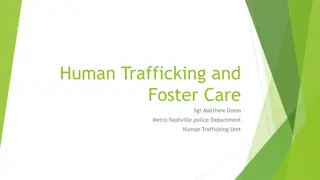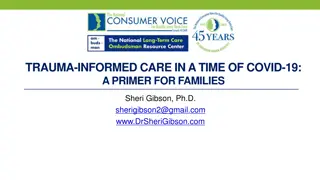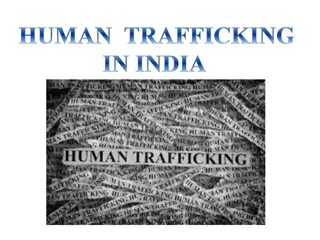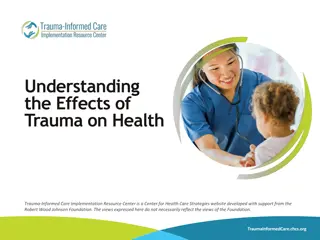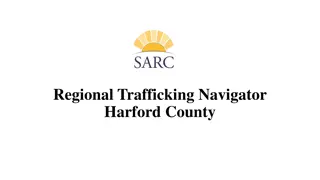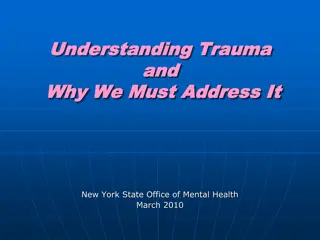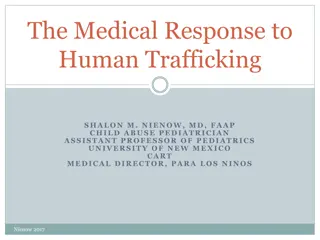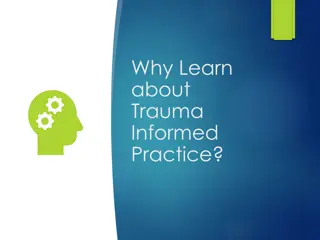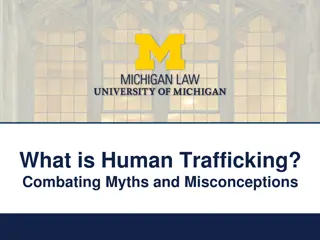Understanding Trauma-Informed Care for Human Trafficking
This training course delves into the critical aspects of handling suspected human trafficking cases and caring for trafficked individuals. It covers recognizing trauma, ensuring patient safety, and providing specialized care approaches. Health workers are urged to address trafficking as a health issue, integrating it into clinical assessments with sensitivity. Trauma-informed care entails acknowledging violence in patient encounters, understanding the impacts of trauma, facilitating disclosure, and making referrals to appropriate services. The workplace should support confidential discussions on human trafficking with patients.
Download Presentation

Please find below an Image/Link to download the presentation.
The content on the website is provided AS IS for your information and personal use only. It may not be sold, licensed, or shared on other websites without obtaining consent from the author. Download presentation by click this link. If you encounter any issues during the download, it is possible that the publisher has removed the file from their server.
E N D
Presentation Transcript
Course Objectives 1. Know how to handle a suspected case 2. Know how to care for a recognized trafficked person referred to you Session Objectives Understand human trafficking Identify major health consequences of trafficking Recognise key features of trauma-informed care Recognize techniques for provider and patient safety Understand the benefits of specialized care approaches Identify possibilities and limitations of role of health care providers 2
CORE MODULE Trauma-informed Care 3
Session Objectives Recognise key features of trauma-informed care Recognise techniques for provider and patient safety Understand the benefits of specialized care approaches for trafficked persons 4
Health workers should stay within the confines of diagnosing medical problems and not ask patients about exploitative situations or trafficking in persons. 5
Trafficking is a health problem Trafficking, like other forms of violence, is a health problem It is part of a health assessment It should be addressed in a clinical encounter 6
What is trauma-informed care Trauma-informed care is about: Recognising violence in patient encounters and in your clinical practice Learning about and being accepting of the effects that traumatic events can have on people s attitude, behaviour and perceptions of their body Making time and space for individuals to disclose and describe traumatic events Addressing violence in sensitive and safe ways Being prepared to facilitate referral to other medical and non- medical services 7
My workplace is conducive to confidentially discuss human trafficking and exploitative situations with my patients. 8
In my practice there is not enough time to ask about trafficking if I suspect someone might be trafficked (or if I know they are a trafficked person). 9
Recognise past trauma in your clinical approach Clinical encounter Unpredictable events Uncontrollable events Clear information Decision-making power 10
The trauma-informed care approach Create a clinical safe space for disclosure and discussion Promote patient decision-making Establish and maintain patient safety Establish and maintain provider safety Ensure informed consent 11
Clinical safe space for disclosure and discussion Create an environment and approach that enables you to ask about violence and people feel at ease to disclose abuse and express their concerns Ensure a quiet, uninterrupted atmosphere, conducive to disclosure. (door, phone, others) Ensure privacy and anonymity and communicate these assurances to patients Make eye contact and be perceptive Show acceptance and understanding, not judgements or disapproval Help normalise symptoms by sharing information about common responses to trauma 12
Promoting patient decision-making Give information about procedures and treatment options before beginning examination or care Provide a step-by-step description while giving care Provide clear information about diagnoses or follow-up procedures promptly Confirm that patients understand what has been communicated by asking questions and soliciting responses 13
Promoting patient decision-making Empower individuals to have control in a clinical encounter Ensure that consent is requested, well-informed and given freely Give individuals opportunities to ask questions and raise objections Listen and watch carefully for verbal and non-verbal signals Do not give legal or other non-health advice Do not make promises that you re not sure you can keep 14
Establishing and maintaining patient safety Try to talk to the individual alone. Be vigilant about who accompanies or observes the patient Solicit and listen carefully to individuals perceptions of risks and their safety Manage patient case file notes and information with care Limit information-sharing and casual discussions about trafficked patients, even anonymously Make careful decisions about disclosure of information to colleagues and others (family, friends) 15
Establishing and maintaining provider safety Be vigilant about who accompanies or watches over patient Do not give out your personal information or contact details Do not offer to provide housing or other non- professional support Identify support for your emotional and psychological needs 16
Informed consent When do you need it? to make a referral to another service to conduct medical procedures to disclose case file notes to other professionals (e.g., medical practitioners, police, legal assistance) to transfer a patient s care to another provider 17
Informed consent What is the procedure? Describe clearly all information (in their language) that individuals need to make decisions Explain neutrally any advantages and disadvantages Ask if they have any questions or need clarification Confirm that they have understood the information you provided Ask in a neutral manner whether they agree to the action that you have proposed 18
Conclusions A trauma-informed care approach is necessary when caring for trafficked persons 19
SESSION END Trauma-informed Care 20





